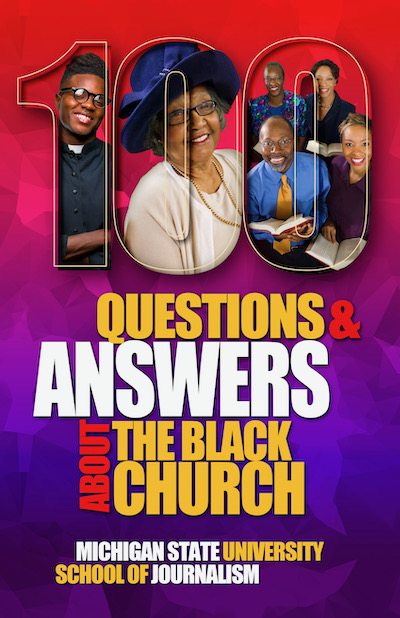Celebrating the 20th guide by MSU School of Journalism’s Bias Busters: ‘100 Questions and Answers about The Black Church’

Front Edge Publishing and Michigan State University’s School of Journalism are proud to announce the upcoming publication of 100 Questions & Answers About The Black Church: The Social and Spiritual Movement of a People. This is the 20th guide created by the Michigan State University School of Journalism’s Bias Busters team to teach cultural competence by spreading awareness about specific groups and communities. Ultimately, the goal is to break down cultural and socially constructed walls by opening discussion among people.
Help spread this good news!
This week, the new guide is just appearing on Amazon for sale. You can help spread this good news by pre-ordering your copy now, which will be delivered to you in a few weeks when the guide is officially released. Pre-sales help the Bias Busters team by boosting awareness across Amazon, which tracks overall reader interest through pre-sales.
You also can help by sharing this news story via social media or email.
How are these guides used?
The guides have been used for Diversity, Equity and Inclusion (DEI) training in business, the health industry, interfaith groups, universities and law enforcement—as well as in congregations and community groups nationwide.
What’s in this new guide?
Forged in the furnace of U.S. segregation, the Black Church is the pillar of African American communities across the country. In his introduction to this guide, the Rev. Charles Adams—who ranks among the nation’s most famous preachers in national polls—writes that leaders of the Black Church, “have changed the world for the better and helped humanity to morally progress in labor relations, distribution of resources, education, health care, equal protection under the law, access to opportunity, housing, economic development and social activism.”
Adams wrote that this guide, “is concise but in no way superfluous. So when you encounter the efficacy of the African American worship tradition or if you seek it out, you will be well prepared. Even if you just want to know enough to increase your understanding, you will enjoy this offering.”
The Michigan State University Journalism School designs and writes these for curious people who seek answers to basic questions for a group, religion or culture they want to learn about.
This guide answers the call that TIME magazine raised in a headline, “To understand America, you need to understand the Black Church.”
We agree. The Black Church is a response to enslavement and discrimination, but its momentum is independent of outside forces. It is both an alliance of seven Christian denominations and a longstanding instrument of social change.
This dual identity takes our search for answers in several directions. Some of the questions “100 Questions and Answers About the Black Church” addresses:
- Why were Black Churches created?
- Why did enslaved people convert to Christianity?
- What was the “Slave Bible”?
- How did Black migration to the North affect the church?
- How are Black Churches sanctuaries?
- Why are they attacked?
- What is the Black social gospel?
- What is Black Liberation Theology?
- What type of preaching occurs in the Black Church?
- Does the Black Church ordain women?
- What are the origins of gospel music?
- How do sacred and secular music interact?
- Are pulpits more political in Black Churches?
- What role does the church play in Black Lives Matter?
The answers come from research and the voices of people who have lived these experiences. The guide shows how the Black Church connected with and gave wings to sociologist W. E. B. Du Bois, former president Barack Obama, Sunday School pioneer Katy Ferguson, the Rev. Dr. Martin Luther King Jr., author Michael Eric Dyson, queen of soul Aretha Franklin, singer-songwriter John Legend and social activist Alice Walker.
The MSU Bias Busters approach cultural competence on the basis that questions asked out of sincere interest, even if phrased in a less than graceful manner, are the best way to bridge cultures. The guides are meant to start that process and to lead to face-to-face conversations. The guides are ice breakers individuals can read on their own to make awkward conversations easier. Answers in these cultural competence guides are meant to be clear, honest and nonjudgmental.